|

南开校友及各界朋友信息交流平台 |
|
罗旭超
罗旭超先生,广东人。我们班的口语教授之一。 罗先生虽然年事已高,但教我们口语发音时一丝不苟,不厌其烦地纠正错误,反复练习。还经常让同学到他家里去个别辅导。
|
English Poet John Milton (1608-1674) |
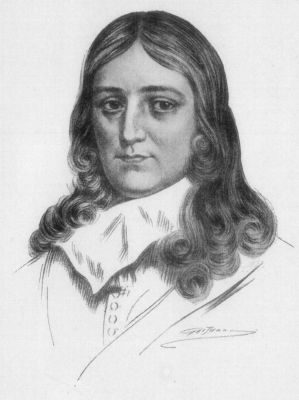
Portrait of John Milton
(This work of art is in the public domain.)
John Milton (1608 – 1674) was an English poet, author, polemicist and civil servant for the Commonwealth of England. He is best known for his epic poem Paradise Lost and for his treatise condemning censorship, Areopagitica. Milton was writing at a time of religious and political flux in England. His poetry and prose reflect deep convictions, often reacting to contemporary circumstances, but it is not always easy to locate the writer in an obvious religious category. His views may be described as broadly Protestant, and he was an accomplished, scholarly man of letters, polemical writer and an official in the government of Oliver Cromwell.
 
|
SONNET XIX.
ON HIS BLINDNESS
by John Milton
WHEN I consider how my light is spent,
Ere half my days in this dark world and wide,
And that one talent which is death to hide
Lodged with me useless, though my soul more bent
To serve there with my Maker, and present
My true account, lest He returning chide,
'Doth God exact day-labour, light denied?'
I fondly ask. But patience, to prevent
That murmur, soon replies, 'God doth not need
Either man's work or his own gifts. Who best
Bear his mild yoke, they serve him best. His state
Is kingly: thousands at his bidding speed,
And post o'er land and ocean without rest;
They also serve who only stand and wait. |
|
Quotes from Paradise Lost
by John Milton
-
The mind is its own place, and in itself
-
Can make a heav'n of hell, a hell of heav'n.
------Book 1, lines 254-5
-
Better to reign in hell, than serve in heav'n.
------Book 1, line 263
-
Who overcomes
-
By force, hath overcome but half his foe.
------Book 1, lines 648-9
-
-
-
Let none admire
-
That riches grow in Hell; that soil may best
-
Deserve the precious bane.
------Book 1, lines 690-2
-
Where there is then no good
-
For which to strive, no strife can grow up there
-
From faction; for none, sure, will claim in Hell
-
Precedence; none, whose portion is so small
-
Of present pain, that with ambitious mind
-
Will covet more.
------Book 2, lines 30-5
-
Our greatness will appear
-
Then most conspicuous, when great things of small,
-
Useful of hurtful, prosperous of adverse,
-
We can create.
------Book 2, lines 257-60
-
As when, to warn proud cities, war appears
-
Waged in the troubled sky, and armies rush
-
To battle in the clouds; before each van
-
Prick forth the airy knights, and couch their spears,
-
Till thickest legions close; with feats of arms
-
From either end of Heaven the welkin burns.
------Book 2, lines 533-8
- The world shall burn; and from her ashes spring
- New Heaven and Earth, wherein the just shall dwell.
------Book 3, lines 334-5
-
God shall be all in all.
------Book 3, line 341
Order from disorder sprung.
------Book 3, line 713
- Ease would recant
- Vows made in pain, as violent and void.
- For never can true reconcilement grow
- Where wounds of deadly hate have pierced so deep.
------Book 4, lines 96-9
- This is servitude,
- To serve the unwise.
------Book 6, lines 178-9
- Heaven, the seat of bliss,
- Brooks not the works of violence and war.
------Book 6, lines 273-4
- Angels, contented with their fame in Heaven,
- Seek not the praise of men.
------Book 6, lines 375-6
- Let it profit thee to have heard,
- By terrible example, the reward
- Of disobedience.
------Book 6, lines 909-11
- And God made two great lights, (great, for their use
- To man,) the greater to have rule by day,
- The less by night.
------Book 7, lines 346-8
- O Earth, how like to Heaven, if not preferred
- More justly--seat worthier of Gods, as built
- With second thoughts, reforming was was old!
- For what God, after better, worse would build?
------Book 9, lines 99-102
- For only in destroying I find ease
- To my relentless thoughts.
------Book 9, lines 129-30
- To me shall be the glory sole among
- The infernal Powers, in one day to have marred
- What he--Almighty styled--six nights and days
- Continued making; and who knows how long
- Before had been contriving?
------Book 9, lines 135-9
- For not to irksome toil, but to delight,
- He made us, and delight to reason join'd.
------Book 9, lines 242-3
- For solitude sometimes is best society,
- And short retirement urges sweet return.
------Book 9, lines 249-50
- Know thy birth!
- For dost thou art, and shalt to dust return.
------Book 10, lines 207-8
- Nor love thy life, nor hate; but what thou livest
- Live well; how long, or short, permit to Heaven.
------Book 11, lines 553-4
- The world was all before them, where to choose
- Their place of rest, and Providence their guide:
- They hand in hand with wand'ring steps and slow,
- Through Eden took their solitary way.
------Book 12, lines 646-9
|
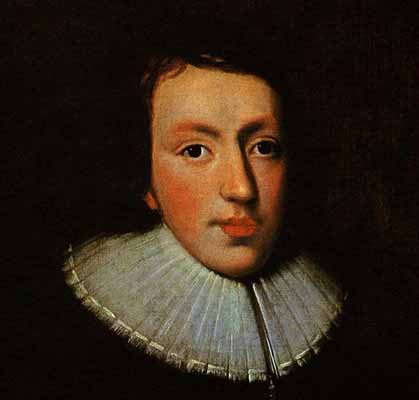
Milton in Early 20s.
(This work of art is in the public domain.)
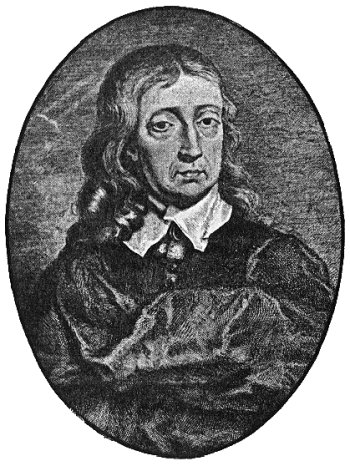
Milton in Later Life
(This work of art is in the public domain.)
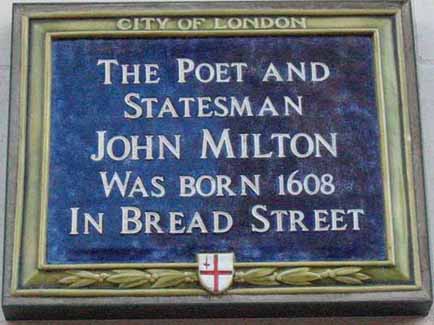
Milton's Plaque in Bread Street, London, where Milton was born.
(All rights of the photo are released by the author Man Vyi into the public domain.)
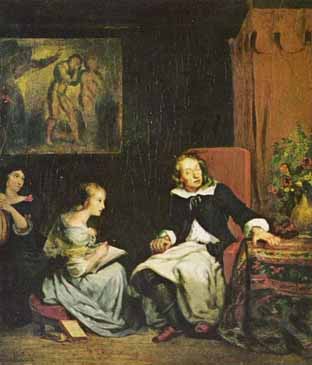
Milton Reading to His Daughters
(This work of art is in the public domain.)
 
|
   
|

